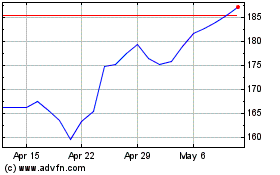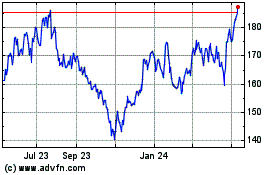3rd UPDATE: Texas Instruments To Buy National Semi For $6.5 Billion
April 04 2011 - 8:24PM
Dow Jones News
Texas Instruments Inc. (TXN), in a move to expand its analog
chip business, agreed to buy National Semiconductor Corp. (NSM) for
about $6.5 billion in cash, a lofty 78% premium to the company's
current valuation.
Analog chips--which take real-world signals, such as sound and
light, and convert them to digital signals--are used in products
ranging from cellphones to industrial equipment. Texas Instruments
has targeted analog as a key growth area, and the industry has seen
demand bounce back following a steep falloff during the
recession.
Texas Instruments said the analog market was $42 billion in
2010. Texas Instruments had $6 billion in analog sales, or 14% of
the market, the company said, while National Semiconductor had $1.6
billion, or 3% of it.
The Dallas company expects the deal to accelerate its expansion
in the industrial market through National Semiconductor's strong
position in power-management semiconductors and other chips, Texas
Instruments Chairman and Chief Executive Rich Templeton said during
a conference call to discuss the deal.
"The bottom line is the combination of TI and National
Semiconductor means we can engage with customers in application
segments where we have no or minimal engagement today," Templeton
said. The combined sales team will be 10 times larger than
National's is today, he added.
Gregg Lowe, senior vice president of Texas Instruments' analog
business, told Dow Jones Newswires that the company has no plans to
lay off employees from the areas of engineering, manufacturing,
product groups and sales, but there could be some layoffs in
corporate general and administrative.
"The focus and the strategic rationale for the transaction is
really one based on growth and opportunity," he said.
National Semiconductor Chief Executive Don Macleod said in an
interview with Dow Jones Newswires that it hasn't yet been
determined if he will remain with the combined company after the
deal closes.
He said during the call that National Semiconductor wasn't
looking to be bought but was approached by Texas Instruments. The
two companies are complementary in their technology and end
markets, he said, and have minimal overlap.
Texas Instruments agreed to pay $25 per share for National
Semiconductor of Santa Clara, Calif., shares of which ended Monday
at $14.07. The companies said they expect the deal to close in the
next six to nine months.
The agreement pushed National Semiconductor shares up 73% to
$24.31 in after-hour trading. Over the past 12 months, National
Semiconductor has traded between $11.84 and $16. Meanwhile, shares
of Texas Instruments slid 1.6% to $33.55 in after-hour trading.
The deal also helped lift other chip maker's stocks. Following
the acquisition announcement, shares of analog chip makers Analog
Devices Inc. (ADI) rose 4.4%; Linear Tech Corp (LLTC) was up 2.8%;
and Maxim Integrated Products Inc. (MXIM) rose 5.1%.
The acquisition should add to Texas Instruments's earnings
within a year, excluding the costs of the transaction, Templeton
said. The deal also should help Texas Instruments's margins, he
said, and generate cost savings at a $100 million annualized run
rate starting a year from the deal's close.
In addition, Templeton said, National Semiconductor eventually
should be able to grow its analog revenue at the same rate as Texas
Instruments. TI, on average, generates analog revenue growth at
twice the market average, he said. And Templeton expects the return
on the National Semi deal to exceed the cost of capital to buy the
company within three to four years.
Texas Instruments expects to have about $3 billion to $4 billion
in debt from the deal, depending on the close date, Chief Financial
Officer Kevin March said.
"This is a deal that makes sense financially and operationally,"
said Gleacher & Co. analyst Doug Freedman, adding that many of
the company's sales people are located near one another. The
companies share some of the same customers, he said, and their
chips often end up next to one another in various products.
"It's a great way to consolidate a lot of customers under the TI
umbrella," Longbow Research analyst JoAnne Feeney said. "Their
ability to absorb National Semi's product line will help further
develop their relationships with customers."
Texas Instruments has been increasing its focus on highly
profitable analog and embedded-application chips while winding down
its business selling mobile baseband chips after major cellphone
makers shifted to a multisupplier strategy. The company also has
been using its ample cash to buy other companies, build plants, and
beef up its sales and engineering forces in China and India.
-By Shara Tibken, Dow Jones Newswires; 212-416-2189;
shara.tibken@dowjones.com
--Nathan Becker and Corrie Driebusch contributed to this
article.
Texas Instruments (NASDAQ:TXN)
Historical Stock Chart
From Jun 2024 to Jul 2024

Texas Instruments (NASDAQ:TXN)
Historical Stock Chart
From Jul 2023 to Jul 2024
